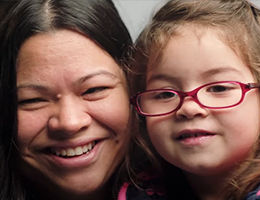We’re Stronger Together
With your help, we can make ambitious innovations in clinical care and education for our community.
The department of pediatric ophthalmology at Loma Linda University has a team of eye specialists ready to serve your child. We care for infants and children with diverse visual, medical, and developmental needs. Our top priority is providing comprehensive care for pediatric eye conditions, all in a kid-friendly environment.
We are actively involved in clinical research in strabismus, amblyopia, retinopathy of prematurity and vision screenings. Through both patient care and research, we are committed to giving children the best vision possible.
The doctors in the department of pediatric ophthalmology specialize in diagnosing and treating eye conditions including those listed below. We also treat eye problems related to other diseases such as craniosynostosis, diabetes, genetic disorders, and juvenile arthritis. The pediatric ophthalmologists also treat adults with strabismus because of their expertise in correcting eye misalignment.
Here in the department of pediatric ophthalmology, we pride ourselves on excellent patient care. Our services include:

We have access to leading edge diagnostic testing to help understand your child’s eyes.
We will need to understand your child’s medical and eye history. We will then test your child’s vision and how the eyes team together. Eye drops may be used to dilate your child’s pupils. These drops take 30 minutes or longer to take effect, and then an optometrist or ophthalmologist will evaluate your child’s eye health and need for glasses.
An ophthalmic assistant tests vision and other technical parts of the exam. An orthoptist assesses how the eye muscles work together and how the eyes move. The orthoptist may take eye muscle surgery measurements, prescribe eye exercises, or evaluate for prisms. A resident is a medical doctor (MD or DO) who is training to become an ophthalmologist. An optometrist is a doctor of optometry (OD) trained in diagnosing and treating eye conditions. Treatments can include glasses, contact lenses, or eye medications. An ophthalmologist is a medical doctor (MD or DO) who specializes in diagnosing and treating eye conditions. Treatments can include glasses, contact lenses, or eye medications.
The eye drops dilate your child’s pupils to take a full look inside of the eyes and to accurately measure a glasses prescription. The side effects of dilation include light sensitivity and blurry vision. This usually wears off after 4 to 8 hours but can last longer, so keep this in mind when planning for activities after the appointment. We will provide dark temporary sunglasses for your child to wear on the way home. The frequency of dilation will be determined by the optometrist or ophthalmologist, depending on your child’s diagnosis.
We customize the exam to your child’s age and abilities. We test the vision of pre-verbal or non-verbal patients through matching games or even watching visual behavior, like tracking a toy or a light. The dilated portion of the eye exam gives reliable information without your child providing a response.
Many children may not be able to describe what they see or discern what is considered normal vision. A full eye examination allows us to formally check what your child can see and what their eyes show us.
Please feel free to contact our clinic at 909-558-2154 with any questions or concerns you may have.


We have access to leading edge diagnostic testing to help understand your child’s eyes.
We will need to understand your child’s medical and eye history. We will then test your child’s vision and how the eyes team together. Eye drops may be used to dilate your child’s pupils. These drops take 30 minutes or longer to take effect, and then an optometrist or ophthalmologist will evaluate your child’s eye health and need for glasses.
An ophthalmic assistant tests vision and other technical parts of the exam. An orthoptist assesses how the eye muscles work together and how the eyes move. The orthoptist may take eye muscle surgery measurements, prescribe eye exercises, or evaluate for prisms. A resident is a medical doctor (MD or DO) who is training to become an ophthalmologist. An optometrist is a doctor of optometry (OD) trained in diagnosing and treating eye conditions. Treatments can include glasses, contact lenses, or eye medications. An ophthalmologist is a medical doctor (MD or DO) who specializes in diagnosing and treating eye conditions. Treatments can include glasses, contact lenses, or eye medications.
The eye drops dilate your child’s pupils to take a full look inside of the eyes and to accurately measure a glasses prescription. The side effects of dilation include light sensitivity and blurry vision. This usually wears off after 4 to 8 hours but can last longer, so keep this in mind when planning for activities after the appointment. We will provide dark temporary sunglasses for your child to wear on the way home. The frequency of dilation will be determined by the optometrist or ophthalmologist, depending on your child’s diagnosis.
We customize the exam to your child’s age and abilities. We test the vision of pre-verbal or non-verbal patients through matching games or even watching visual behavior, like tracking a toy or a light. The dilated portion of the eye exam gives reliable information without your child providing a response.
Many children may not be able to describe what they see or discern what is considered normal vision. A full eye examination allows us to formally check what your child can see and what their eyes show us.
Please feel free to contact our clinic at 909-558-2154 with any questions or concerns you may have.

With your help, we can make ambitious innovations in clinical care and education for our community.